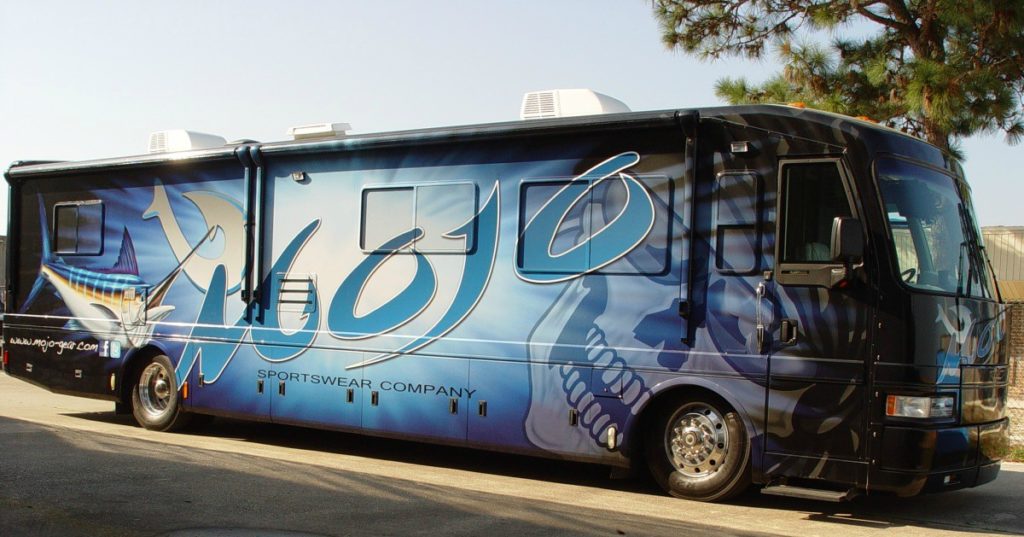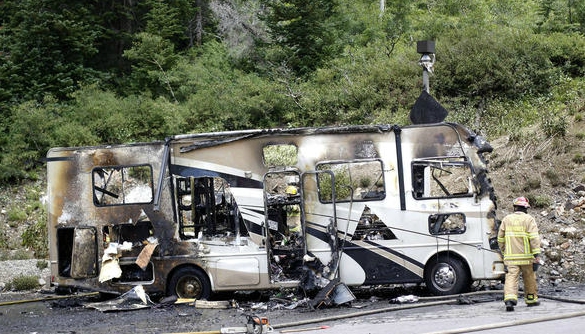It’s common to see private trailers and motor coaches with RV business advertising graphics splashed across the rig. Some have vinyl lettering with a simple business logo. Others slap full-color wraps on every square inch. Today, many nomadic entrepreneurs use their RVs for business purposes. Unfortunately many of them may not be carrying the right kind of RV insurance coverage.
3 Things to Know About RV Business Advertising Graphics for our RV
In a Branding Your Rig webinar, RV insurance experts explained why applying logo graphics on your RV can be risky. Sponsored by Xscapers, a segment of the Escapees RV Club, the discussion featured a RV insurance expert, a well-known RV safety educator and a certified public accountant. Here’s what they wanted nomadic entrepreneurs to know.
Advertising Your Logo is a Red Flag to Your Insurance Company
RVs can make eye-catching rolling advertisements, but the minute you announce your business on the RV, your insurance company probably sees you as a commercial vehicle owner. This puts you in a different pool of insureds, which personal RV insurance policies don’t cover.
“When your logo is on the rig, and it’s clear you are using it for commercial purposes, you need a commercial policy,” explains Courtney Wooge, President of FCIS Insurance in Iowa. “The bigger the ‘billboard’ the higher the chance you need commercial coverage,” he says.
Whether or not you see customers inside your RV, using it for business use isn’t much different than a retail store or restaurant opening its doors to the public. In the eyes of RV insurance companies, using a motor home, trailer or other RV places the owner into a higher-risk insurance category. “Insurance companies see it as a “rolling office,” says Wooge.
The Effects of a Commercial RV Insurance Policy
When you work from your RV, the cost implications of RV business advertising graphics are enormous. For example, let’s say your insurance agent doesn’t know you’re working from the RV. Should you have an accident or general loss on the vehicle, your policy probably won’t cover it.
On the upside, with a proper (and more expensive) commercial RV insurance policy, you will be covered if the worst happens.
Commercial RVs Meet Different Requirements
Let’s say you do the right thing, and register your RV as a commercial vehicle. Afterwards, a slew of ramifications apply. Pulling over at highway weigh stations is one of the biggest. Escapees RV Club’s Safety and Education Director, Jim Koca highlighted some consequences of obtaining commercial RV coverage.
For starters, business use can void your RV warranty. Koca says that “When you register as a commercial vehicle, you lose your warranty on the RV.” Full-time RVers living in the vehicle also face that problem.
Motorcoach owners are often surprised to learn they need a Class A CDL commercial license endorsement. Koca says that in some states like Texas, commercial vehicle owners need a commercial truck driver’s license endorsement.
And just as truckers must do, owners of commercial RVs over a certain GVWR must pull over at weigh stations along the highway, or risk serious fines. “The chances of getting pulled over if you’re not branded are slim to none. But it depends on whether or not it’s a slow day,” Koca explains.
Talk to Your RV Insurance Agent and Roll Risk-Free
All insurance companies have different requirements for categorizing RVs as commercial or private policies. Many won’t require a commercial policy for RV entrepreneurs who never allow customers to step inside.
“If you’re a blogger and putting your URL on your rig, that could generally be titled and insured personally.” Wooge says that in these situations, a personal RV insurance policy is a no-brainer.
The important thing to remember is to avoid RV business advertising graphics until you talk to your RV insurance agent. Don’t agree to a policy until everything is on the table with the company. Share photos of your RV and give a full disclosure about your business. Be upfront about how you use the RV and get the correct policy for your needs.
Should the worst happen and you need to file a claim, you’ll have peace of mind knowing that nothing was hidden from the company that can help you get back on the road and making money from your RV.



What about RVs that simply want to be a rolling billboard for a commercial enterprise? The RV owner would not be conducting any business. The owner would only be collecting a “fee” for having the advertising on the RV.